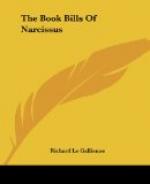Pitiable, indeed, will seem to him in that hour the cowardice that dares to cloak its sinning with some fine-spun theory, that veils the gratification of its desires in some shrill evangel, and wrecks a woman’s life in the names of—Liberty and Song! Art wants no such followers: her bravest work is done by brave men, and not by sneaking opium-eaters and libidinous ‘reformers.’ We all have sinned, and we all will go on sinning, but for God’s sake, let us be honest about it. There are worse things than honest sin. If, God help you, you have ruined a girl, do penance for it through your life; pay your share; but don’t, whatever you do, hope to make up for a bad heart by a good brain. Foolish art-patterers may suffer the recompense to pass, for likely they have all the one and none of the other; but good men will care nothing about you or your work, so long as bad trees refuse to bring forth good fruit, or figs to grow on thistles.
We have more to learn from Florentine artists than any ‘craft mystery.’ If the capacity for using the blossom while missing the evil fruit, of which Mr. Pater speaks in the case of Aurelius, were only confined to those evil-bearing trees: alas! it is all blossom with us moderns, good or bad alike, and purity or putrescence are all one to us, so that they shine. I suppose few regard Giotto’s circle as his greatest work: would that more did. The lust of the eye, with Gautier as high-priest, is too much with us.
The poet, too, who perhaps began with the simple ambition of becoming a ‘literary man,’ soon finds how radically incapable of ever being merely that he is. Alas! how soon the nimbus fades from the sacred name of ‘author.’ At one time he had been ready to fall down and kiss the garment’s hem, say, of—of a ‘Canterbury’ editor (this, of course, when very, very young), as of a being from another sphere; and a writer in The Fortnightly had swam into his ken, trailing visible clouds of glory. But by and by he finds himself breathing with perfect composure in that rarefied air, and in course of time the grey conviction settles upon him that these fabled people are in no wise different from the booksellers and business men he had found so sordid and dull—no more individual or delightful as a race; and he speedily comes to the old conclusion he had been at a loss to understand a year or two ago, that, as a rule, the people who do not write books are infinitely to be preferred to the people who do. When he finds exceptions, they occur as they used to do in shop and office—the charm is all independent of the calling; for just as surely as a man need not grow mean, and hard, and dried up, however prosperous be his iron-foundry, so sure is it that a man will not grow generous, rich-minded, loving, and all that is golden by merely writing of such virtues at so much a column. The inherent insincerity, more or less, of all literary work is a fact of which he had not thought. I am speaking




